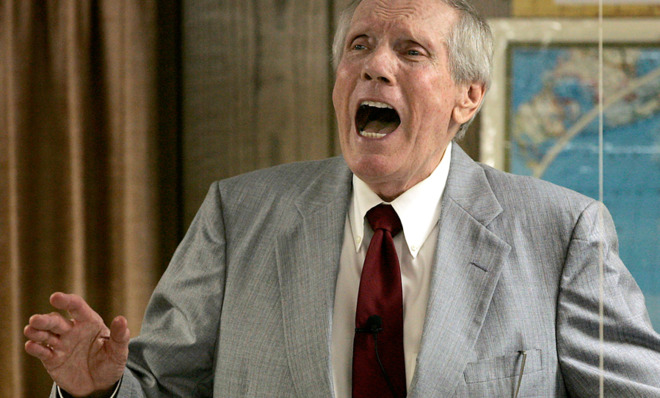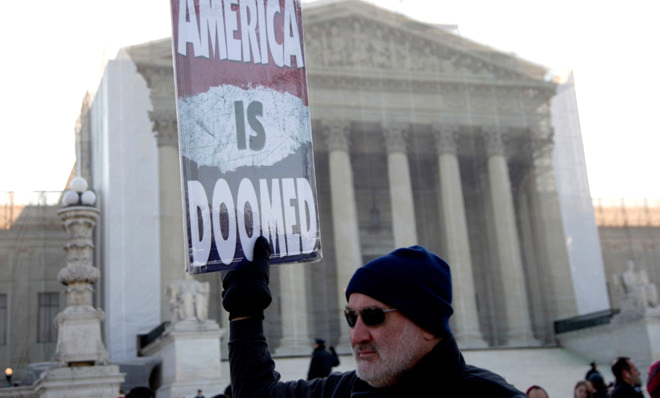Why Christians should forgive Fred Phelps
Forgiveness begins not with a dismissal of guilt, but with an acknowledgement of it

Fred Phelps, the founder of the Westboro Baptist Church, reportedly passed away today. His death brings up conflicted memories — memories that, I imagine, would have been easier to brush away if I had not personally encountered the man and his congregation.
I met the Phelps family when the Westboro Baptist Church briefly picketed my undergraduate institution, Brandeis University. At the time I wrote for my school paper, and wanted to interview Shirley Phelps-Roper, the daughter of Fred Phelps, to find out why Brandeis had been chosen for a picket.
As it turned out, Brandeis had been selected more or less for having a certain Jewish character, but one of the things you pick up on when you talk to the folks at the Westboro Baptist Church is that targets are usually symbolic and on a lesser order of importance, anyhow: For them, the entire world is suffuse with sin, so there really is no such thing as picketing a person, event, or institution that doesn't deserve it. Another thing you pick up on pretty quickly is that the people of the Westboro Baptist Church are disarmingly nice.
The Week
Escape your echo chamber. Get the facts behind the news, plus analysis from multiple perspectives.

Sign up for The Week's Free Newsletters
From our morning news briefing to a weekly Good News Newsletter, get the best of The Week delivered directly to your inbox.
From our morning news briefing to a weekly Good News Newsletter, get the best of The Week delivered directly to your inbox.
It takes something of an incisive ear for content to cut through the odd juxtaposition of archaic speech and stunning profanity the WBC communicates in. Now slangy, twangy, and Midwestern, then stilted and echoing Reformation-era clerical oratory, the message can be difficult to uncover. But drilled down to its core, it's simple: In the view of the WBC, the world is saturated with sin, detested by God, and destined for hell; even their tiny remnant isn't assured salvation, and they'll be the first to tell you they're as potentially hell-bound as you are. It's an idiosyncratic version of a relatively common (if somewhat decreased in popularity) theological position that used to dominate more Protestant discourse than it does in this day and age.
By most accounts it is the medium, not the message that Americans so intensely object to. It's hard to explain the picketing of funerals and defamation of dead people unknown to the WBC, and more challenging yet to account for the joy they seem to derive from the real pain they cause others. So, if what they do is insensitive and reprehensible and what they say is lurid, archaic, and offensive, is there anything about them worthy of salvaging in discourse or memory now that founder Fred Phelps has reportedly passed away?

As a Christian, I think so. For all the bizarre and alarming language and symbolic images packed into the rhetoric of the WBC for shock value, their theology isn't purely a sideshow. Though the message is garbled by the choice of venue, phrasing, and a general lack of common decency, the WBC is right to question an American obsession with militarism and to protest on issues of life and our overly licentious sexual culture that most seem content to huff about but not to directly confront or decry. The aspects of their theology that are most dismissive of God’s love and mercy — the infamous "God hates fags" position, for example, which is as obtuse as it is reductive and misleading — are cautionary tales about sloppy reading and motivated hermeneutics.
Greater yet than their political witness, however, is the opportunity for genuine forgiveness they present to fellow Christians. It's undoubtedly the case that the repeated abuse of various groups by the WBC diminished the moral authority of the Christian religion in the eyes of those who Christ would've been most likely to reach out to. In that way, the WBC likely made the job of Christians who witness to vulnerable groups that much harder — something they, given their theology, don't care about. But for the rest of us, searching for the worthwhile and salvageable points of their theology and ethics can be a lesson in forgiveness operating at the highest stakes.
A free daily email with the biggest news stories of the day – and the best features from TheWeek.com
Forgiveness begins not with a dismissal of guilt — that is, not with attempts to diminish or deny the harm that was done — but with an acknowledgement of it. You can't forgive the innocent, after all, only the guilty. In that sense the first step is already completed, as it seems universally agreed upon that the WBC is responsible for a variety of harms. But to proceed from there is not to deny that harm was done, it's instead to look for an avenue to restoring the rapport or relationship that was damaged by the harm. In the case of Christians looking to restore the WBC to fellowship with the totality of the Christian community, restoring that relationship begins with sorting out the pieces of their theology and practice that are insightful from the pieces that are misled and injurious. Part and parcel with recognizing that the WBC are people who have something to contribute even despite their many faults comes the recognition that they are, first of all, people.
Seeing them as such is liberating to those of us who feel disheartened and angry given what they've done because it frees us to see in them something familiar to seek reconciliation with. In forgiving them and locating common ground with them, we have the opportunity to practice — both in the sense of rehearsal and mere doing — forgiveness, and through doing so to strengthen Christian fellowship with forces that could otherwise weaken it. It's hard to look for the worth in people and easy to find the failings, but lived Christianity is challenging for that very reason. Fred Phelps and the WBC may have totally failed to see fragments of truth and value in people and projects they oppose, but that's no reason for the remainder of the Christian community to do the same.
-
 Departure(s): Julian Barnes’ ‘triumphant’ final book blends fact with fiction
Departure(s): Julian Barnes’ ‘triumphant’ final book blends fact with fictionThe Week Recommends The Booker prize-winning novelist ponders the ‘struggle to find happiness and accept life’s ending’
-
 7 lively travel games for adults
7 lively travel games for adultsThe Week Recommends Game on!
-
 Why is the Pentagon taking over the military’s independent newspaper?
Why is the Pentagon taking over the military’s independent newspaper?Today’s Big Question Stars and Stripes is published by the Defense Department but is editorially independent